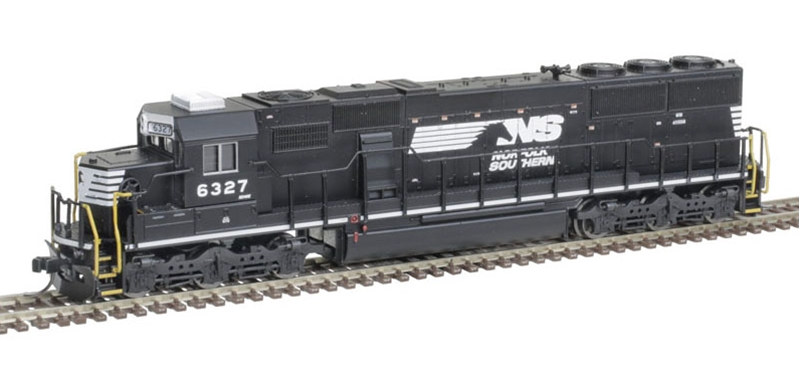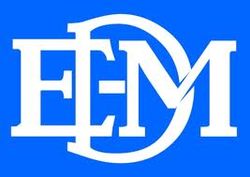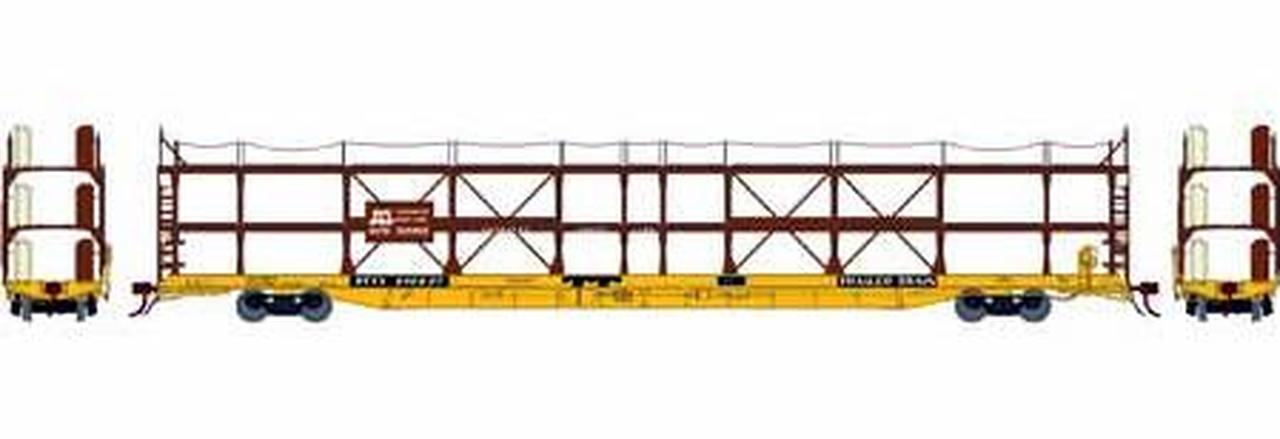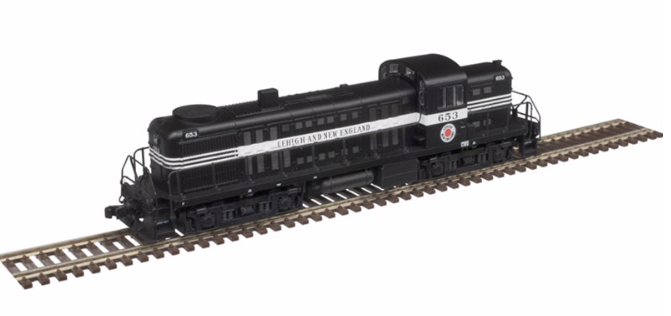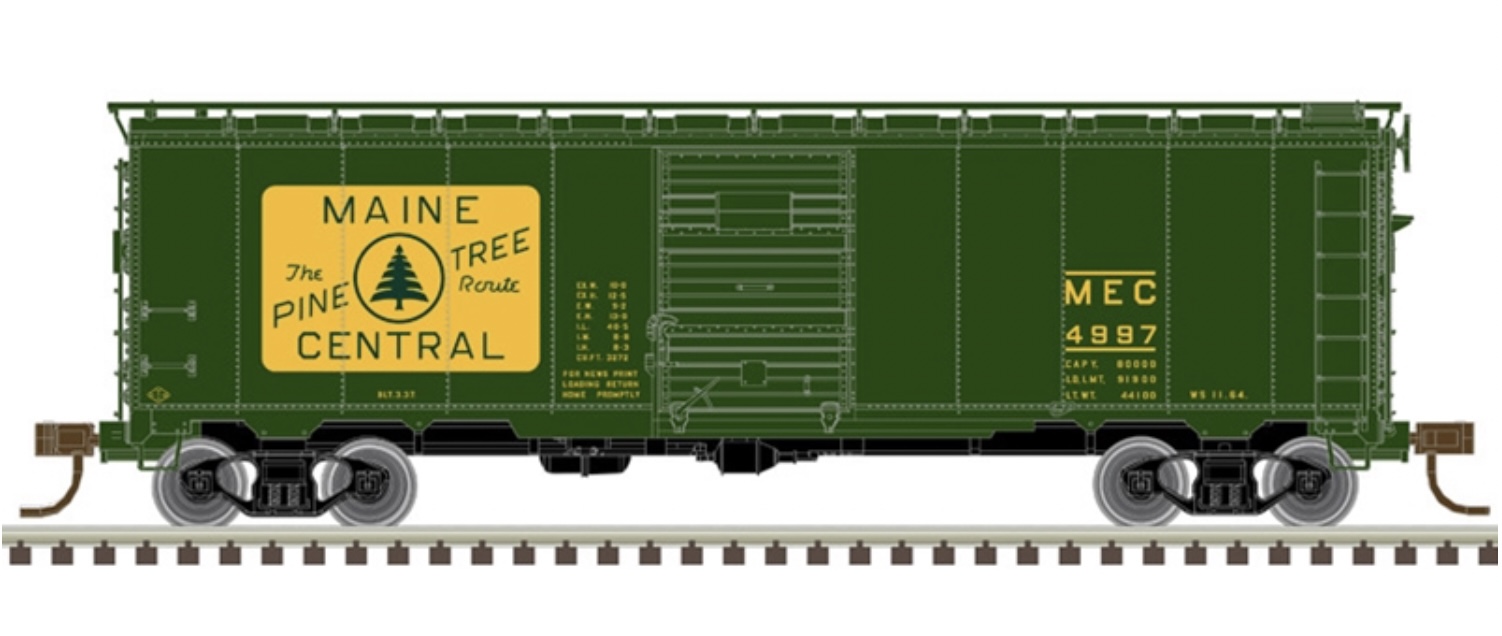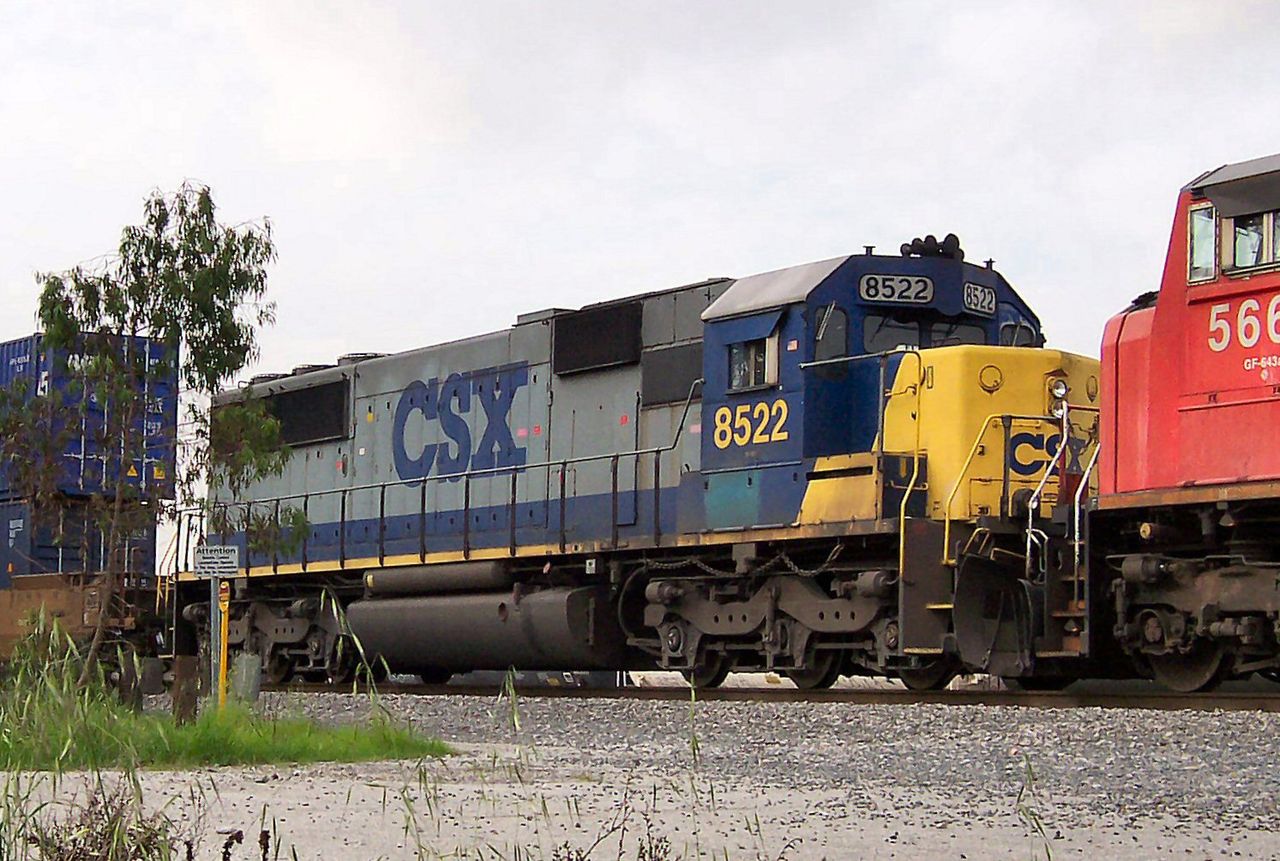Specific Item Information:
The SD40E is an SD50 rebuilt by the Norfolk Southern Railway and derated to 3000 HP (equivalent to an SD40-2).
The SD40E is an SD50 rebuilt by the Norfolk Southern Railway and derated to 3000 HP (equivalent to an SD40-2).
Model Information: Atlas introduced the SD60 in 1998. The SD50 and SD60M followed in 1999. In 2002 they revised the SD60M and SD50. In 2005, Atlas revised the SD60. All three models (SD60, SD60M and SD50) share the same mechanism and differ only in shell detailing. These models also come with uninstalled detail parts such as snow-plow and winterization hatches. These details must be installed by the owner.
The revised versions all carry typical post-2000 mechanisms. Therefore, we see features such as dial flywheels, all-wheel pickup and drive, blackened metal wheels, bi-directional lighting, a split-frame DCC-Ready chassis and easily-swappable body-mount couplers. The revised version feature Atlas' slow-speed motor, golden white LEDs and nicely painted two-tone handrails. Yes, they run very nicely.
The revised versions all carry typical post-2000 mechanisms. Therefore, we see features such as dial flywheels, all-wheel pickup and drive, blackened metal wheels, bi-directional lighting, a split-frame DCC-Ready chassis and easily-swappable body-mount couplers. The revised version feature Atlas' slow-speed motor, golden white LEDs and nicely painted two-tone handrails. Yes, they run very nicely.
DCC Information: The revised version of this model is DCC ready. It is available either in DC or DCC-equipped, with Lenz LE062XF for earlier runs, and with NCE N12A1 for more recent ones.
Models accept the following after market plug-in decoders:
- Digitrax DN163A1: 1 Amp N Scale Mobile Decoder for Atlas N-Scale SD60, SD60M, SD50 and others.
- TCS ALD4: Four Function decoder, for Atlas Long length Drop-in.
- NCE N12A1: Plug and play decoder for N-Scale Atlas SD50, SD60M, SD60.
Models accept the following after market plug-in decoders:
- Digitrax DN163A1: 1 Amp N Scale Mobile Decoder for Atlas N-Scale SD60, SD60M, SD50 and others.
- TCS ALD4: Four Function decoder, for Atlas Long length Drop-in.
- NCE N12A1: Plug and play decoder for N-Scale Atlas SD50, SD60M, SD60.
Prototype History: The SD50 was produced in response to increasingly tough competition from GE Transportation Systems, whose Dash 7 line was proving quite successful with railroads. While EMD's SD40-2 was a reliable and trusted product, GE's line included locomotives up to 3,600 hp (2,685 kW) with more modern technology, as well as very competitive finance and maintenance deals. EMD responded throughout the SD50 program by offering discounts on large orders.
GM-EMD had previously produced 3,600 hp (2,685 kW) locomotives, the SD45 and later SD45-2, but these used huge, 20-cylinder engines with high fuel consumption, and had reliability problems when first introduced. Demand for the 45 series dropped sharply after the 1970s fuel crisis. The SD50 used an updated version of the V16 645 used in the SD40-2, uprated to 3,500 hp (2,600 kW)- and later 3,600 hp (2,685 kW) - at 950 rpm from 3,000 hp (2,240 kW) at 900 rpm. This proved to be a step too far; the 50 series models were plagued by engine and electrical system problems which harmed both sales and the reputation of EMD.
From Wikipedia
Read more on American-Rails.com
GM-EMD had previously produced 3,600 hp (2,685 kW) locomotives, the SD45 and later SD45-2, but these used huge, 20-cylinder engines with high fuel consumption, and had reliability problems when first introduced. Demand for the 45 series dropped sharply after the 1970s fuel crisis. The SD50 used an updated version of the V16 645 used in the SD40-2, uprated to 3,500 hp (2,600 kW)- and later 3,600 hp (2,685 kW) - at 950 rpm from 3,000 hp (2,240 kW) at 900 rpm. This proved to be a step too far; the 50 series models were plagued by engine and electrical system problems which harmed both sales and the reputation of EMD.
From Wikipedia
Read more on American-Rails.com
Road Name History: The Norfolk Southern Railway (reporting mark NS) is a Class I railroad in the United States; began in 1982 and 1990. With headquarters in Norfolk, Virginia, the company operates 36,200 route miles in 22 eastern states, the District of Columbia, and has rights in Canada from Buffalo to Toronto and over the Albany to Montreal route. NS is responsible for maintaining 29,000 miles, with the remainder being operated under trackage rights from other parties responsible for maintenance. The common commodity hauled on the railroad is coal from mines in Indiana, Kentucky, Pennsylvania, Tennessee, Virginia, and West Virginia. The railroad also offers the most intermodal network in eastern North America.
NS is a major transporter of domestic and export coal. The railroad's major sources of the mineral are located in: Pennsylvania's Cambria and Indiana counties, as well as the Monongahela Valley; West Virginia; and the Appalachia regions of Virginia, Kentucky, and Tennessee. In Pennsylvania, NS also receives coal through interchange with R.J. Corman Railroad/Pennsylvania Lines at Cresson, Pennsylvania, originating in the "Clearfield Cluster". NS's export of West Virginia bituminous coal, begins transport on portions of the well-engineered former Virginian Railway and the former N&W double-tracked line in Eastern Virginia to its Lambert's Point coal pier on Hampton Roads at Norfolk. Coal transported by NS is thus exported to steel mills and power plants around the world. The company is also a major transporter of auto parts and completed vehicles. It operates intermodal container and TOFC (trailer on flat car) trains, some in conjunction with other railroads. NS was the first railway to employ roadrailers, which are highway truck trailers with interchangeable wheel sets.
The Norfolk Southern Railway's parent Norfolk Southern Corporation is a Norfolk, Virginia-based parent company. Norfolk Southern Corporation was incorporated on July 23, 1980 in the Commonwealth of Virginia and is publicly traded on the New York Stock Exchange (NYSE) under the symbols NSC. The primary business function of Norfolk Southern Corporation is the rail transportation of raw materials, intermediate products, and finished goods across the Southeast, East, and Midwest United States. The corporation further facilitates transport to the remainder of the United States through interchange with other rail carriers while also serving overseas transport needs by serving several Atlantic and Gulf Coast ports. As of October 1, 2014 Norfolk Southern Corporation's total public stock value was slightly over $34.5 billion.
Read more on Wikipedia.
NS is a major transporter of domestic and export coal. The railroad's major sources of the mineral are located in: Pennsylvania's Cambria and Indiana counties, as well as the Monongahela Valley; West Virginia; and the Appalachia regions of Virginia, Kentucky, and Tennessee. In Pennsylvania, NS also receives coal through interchange with R.J. Corman Railroad/Pennsylvania Lines at Cresson, Pennsylvania, originating in the "Clearfield Cluster". NS's export of West Virginia bituminous coal, begins transport on portions of the well-engineered former Virginian Railway and the former N&W double-tracked line in Eastern Virginia to its Lambert's Point coal pier on Hampton Roads at Norfolk. Coal transported by NS is thus exported to steel mills and power plants around the world. The company is also a major transporter of auto parts and completed vehicles. It operates intermodal container and TOFC (trailer on flat car) trains, some in conjunction with other railroads. NS was the first railway to employ roadrailers, which are highway truck trailers with interchangeable wheel sets.
The Norfolk Southern Railway's parent Norfolk Southern Corporation is a Norfolk, Virginia-based parent company. Norfolk Southern Corporation was incorporated on July 23, 1980 in the Commonwealth of Virginia and is publicly traded on the New York Stock Exchange (NYSE) under the symbols NSC. The primary business function of Norfolk Southern Corporation is the rail transportation of raw materials, intermediate products, and finished goods across the Southeast, East, and Midwest United States. The corporation further facilitates transport to the remainder of the United States through interchange with other rail carriers while also serving overseas transport needs by serving several Atlantic and Gulf Coast ports. As of October 1, 2014 Norfolk Southern Corporation's total public stock value was slightly over $34.5 billion.
Read more on Wikipedia.
Brand/Importer Information: In 1924 Stephan Schaffan, Sr. founded the Atlas Tool Company in Newark, New Jersey. In 1933 his son, Stephan Schaffan, Jr., came to work for his father at the age of sixteen. Steve Jr. built model airplanes as a hobby and frequented a local hobby shop. Being an enterprising young man, he would often ask the owner if there was anything he could do to earn some extra spending money. Tired of listening to his requests, the hobby-store owner threw some model railroad track parts his way and said, "Here, see if you can improve on this".
In those days, railroad modelers had to assemble and build everything from scratch. Steve Jr. created a "switch kit" which sold so well, that the entire family worked on them in the basement at night, while doing business as usual in the machine shop during the day.
Subsequently, Steve Jr. engineered the stapling of rail to fiber track, along with inventing the first practical rail joiner and pre-assembled turnouts and flexible track. All of these products, and more, helped to popularize model railroading and assisted in the creation of a mass-market hobby. The budding entrepreneur quickly outgrew the limitations of a basement and small garage operation. Realizing they could actually make a living selling track and related products, Steve and his father had the first factory built in Hillside, New Jersey at 413 Florence Avenue in 1947. On September 30, 1949, the Atlas Tool Company was officially incorporated as a New Jersey company.
In 1985, Steve was honored posthumously for his inventions by the Model Railroad Industry Association and was inducted into the Model Railroad Industry Hall of Fame in Baltimore, Maryland. In addition, Steve was nominated and entered into the National Model Railroad Association Pioneers of Model Railroading in 1995.
In the early 1990s, the Atlas Tool Company changed its name to Atlas Model Railroad Company, Inc.
In those days, railroad modelers had to assemble and build everything from scratch. Steve Jr. created a "switch kit" which sold so well, that the entire family worked on them in the basement at night, while doing business as usual in the machine shop during the day.
Subsequently, Steve Jr. engineered the stapling of rail to fiber track, along with inventing the first practical rail joiner and pre-assembled turnouts and flexible track. All of these products, and more, helped to popularize model railroading and assisted in the creation of a mass-market hobby. The budding entrepreneur quickly outgrew the limitations of a basement and small garage operation. Realizing they could actually make a living selling track and related products, Steve and his father had the first factory built in Hillside, New Jersey at 413 Florence Avenue in 1947. On September 30, 1949, the Atlas Tool Company was officially incorporated as a New Jersey company.
In 1985, Steve was honored posthumously for his inventions by the Model Railroad Industry Association and was inducted into the Model Railroad Industry Hall of Fame in Baltimore, Maryland. In addition, Steve was nominated and entered into the National Model Railroad Association Pioneers of Model Railroading in 1995.
In the early 1990s, the Atlas Tool Company changed its name to Atlas Model Railroad Company, Inc.
Item created by: Powderman on 2023-02-24 15:03:02. Last edited by grothe77 on 2024-06-09 19:15:04
If you see errors or missing data in this entry, please feel free to log in and edit it. Anyone with a Gmail account can log in instantly.
If you see errors or missing data in this entry, please feel free to log in and edit it. Anyone with a Gmail account can log in instantly.


